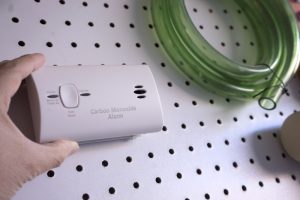 Carbon monoxide poisoning impacts thousands of people each and every year, leading to illness—and in severe cases, even death. We want you to protect your home from the possibility of this happening, so you don’t have to concern yourself about the safety and wellbeing of your home’s occupants.
Carbon monoxide poisoning impacts thousands of people each and every year, leading to illness—and in severe cases, even death. We want you to protect your home from the possibility of this happening, so you don’t have to concern yourself about the safety and wellbeing of your home’s occupants.
Carbon monoxide (CO) is colorless and odorless. This gas isn’t one you can detect on your own. People within your home could get sick without explanation, but you don’t want it to even get to that point. This is why it’s essential that you have a carbon monoxide detector installed by an expert electrician in Spokane, WA.
What You Need to Know about CO
Depending on the community in which you live, there are various laws and rules about where a carbon monoxide detector is needed. Most of these laws state that homeowners must have carbon monoxide detectors within 10 feet of the rooms in which people sleep. Other laws only require carbon monoxide detectors in homes with gas appliances and attached garages.
Really though, every home should be equipped with carbon monoxide detectors. It’s a relatively small investment that makes a world of difference for the people in your home. Keep in mind too, that just like smoke detectors, carbon monoxide detectors should be tested each month. This means holding down the button on the detector to ensure you’ll be able to hear the alarm from across the home.
Are You At Risk?
If you have gas appliances in your home—a gas furnace, stove, gas-powered fireplace—then there is a possibility that you could deal with a carbon monoxide leak. Of course, today, appliances like gas furnaces and boilers are built to be very safe and durable, but that doesn’t mean that you should trust that your heating system is 100% risk-free.
CO is the byproduct of the fuel-burning process. It needs to vent safely to the outside of your home via a flue pipe, vent pipe, or chimney. But, something can go wrong during this process. A cracked heat exchanger, or some other type of damage to your gas line can cause carbon monoxide to leak into your home.
What You Should Do When Purchasing a Gas Powered Appliance
When you by a new gas-powered appliance, such as a heating system, it’s vital that you take the time to seek out a professional, with years of experience and training, to install it. Calling in a general handyman or trusting the job to a “do-it-yourself” enthusiast may seem like the best option—and perhaps the cheapest option—but it can cost you big time, later on down the road.
Without professional installation, not only are you at risk of CO poisoning, but you’re also facing the possibility of constant repair needs, potential system failures, poor appliance efficiency, and other safety hazards—unless you work with a trained professional for your installation.
ACI Northwest is here to help with your home comfort needs or concerns.
Please do not hesitate to contact us for helpful advice.
